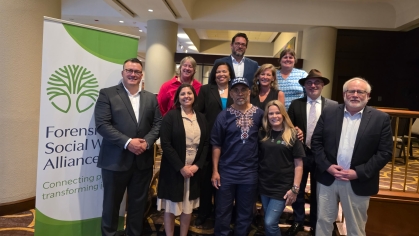Dean George Leibowitz Receives 2025 Sol Gothard Lifetime Achievement Award from National Organization of Forensic Social Work

Dr. George Leibowitz, Dean and Distinguished Professor of the Rutgers School of Social Work, was awarded the 2025 Sol Gothard Lifetime Achievement Award from the National Organization of Forensic Social Work (Forensic Social Work Alliance). The award was presented at the Alliance’s annual conference in New Orleans on May 28, 2025.
The award is named for the Honorable Sol Gothard, who devoted his career to protecting the abused and to improving the legal system to which they are entrusted. A native New Yorker, Gothard was a social worker and attorney who served as a juvenile court and appellate judge in Louisiana until his retirement in 2005.
"Dr. Leibowitz’s life’s work mirrors Judge Gothard’s unwavering dedication to justice, compassion, and elevating the role of forensic social workers in shaping a more ethical, humane world," said conference presenter Dr. Viola Vaughan-Eden of Norfolk State University. "Through every role he has held, Dr. Leibowitz has lived out the values this award represents and continues to inspire all of us who believe in the power of social work to transform lives."
For more than 25 years, Dean Leibowitz has worked at the intersection of mental health, trauma, and the justice system, especially with youth and adults impacted by sexually harmful behavior. His contributions span clinical treatment, policy reform, risk assessment, and training the next generation of forensic social workers. Dean Leibowitz currently serves as a research and clinical member of the Association for the Prevention and Treatment of Sexual Abuse (ATSA) and as a tireless advocate for evidence-based, ethical interventions that restore dignity and promote healing. He co-authored the foundational text, Forensic Social Work: Psychosocial and Legal Issues Across Diverse Populations and Settings 2nd Ed. (2017).
The Alliance was established to advance social justice through the inter-professional collaboration of human service and legal systems, develop forensic standards and best practices, produce quality material for interdisciplinary forensic education and practice, and advocate for court-involved children, youth, adults and families.



